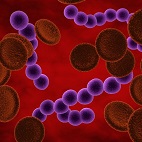Unbiased PCR and Sequencing of Blood Stream Infections |
| 18 July 2018 |
|
One advantage of running molecular assays directly on samples is the detection of non-growing pathogens that have not been cleared from the infection site. Another reason to consider direct 16S rDNA testing is the lower time-to-result compared to culture. Last, by the use of primers binding to 16S rRNA regions that are conserved through the bacterial clade the approach is unbiased and thus covers also rare pathogens. On the occasion of this year’s ECCMID congress in Madrid, Tkadlec et al. [2] presented a poster on the diagnosis of blood stream infections by conventional culture and Molzym’s panbacterial 16S rDNA PCR and Sanger sequencing system, UMD-SelectNA™. In total, 482 blood samples from 330 hospitalised patients with suspected blood stream infections were included in the study. Concordant positive and negative results of culture and UMD-SelectNA™ were obtained with 347 of the 482 samples (72%). Compared to culture, the sensitivity, specificity, positive and negative predictive values of UMD-SelectNA™ were 78.1%, 83.5%, 55.8% and 93.4%, respectively. The authors considered an added value of UMD-SelectNA™ with 36 samples (7.5%) which in addition to culture identified bacteria that were regarded relevant by clinical review and opinion of the treating physicians. Tkadlec et al. [4] reasoned that UMD-SelectNA™ is worth to be considered as a diagnostic tool complementary to culture for the diagnosis of blood stream infections, but also recommended that negative PCR results have to be verified by culture. |
| References |
| [1] Sontakke S, Cadenas MB, Maggi RG, Diniz PP, Breitschwerdt EB (2010) Use of broad range 16S rDNA PCR in clinical microbiology. J Microbiol Meth 76, 217–225. |
| [2] Tkadlec J, Kvapil M, Sramkova L, Drevinek P (2018) Comparison of broad-range 16S rDNA PCR with blood culture in diagnosis of blood stream infections. Poster no. 1938, ECCMID 2018, Madrid, Spain. (download poster) |

 Nowadays, growth-independent molecular detection and identification of aetiological agents of a variety of diseases is practised routinely. Especially, targeted PCR of the 16S rRNA gene followed by sequencing analysis of amplicons is widely used [1].
Nowadays, growth-independent molecular detection and identification of aetiological agents of a variety of diseases is practised routinely. Especially, targeted PCR of the 16S rRNA gene followed by sequencing analysis of amplicons is widely used [1].